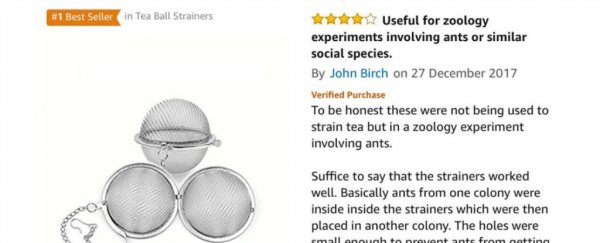Last month, a zoologist left a four-star review on Amazon for a tea strainer, which he had been using to sift ants. No big deal.
The review sat quietly on the site until this week, when other scientists found it, shared it and instantly started a Twitter trend.
We lay-folk have long known that scientists use common objects for strange reasons - see NASA researchers sending rubber ducks into a glacier to track ocean currents, or environmental scientists floating tampons down streams to find pollution.
I think we should all go to @Amazon and leave honest reviews of unusual science equipment #reviewforscience https://t.co/ocxzohjZvB
— Dr Dani Rabaiotti (@DaniRabaiotti) January 30, 2018
But until now, we may not have understood the scope or, frankly, the grossness of the phenomenon.
We present below: #ReviewForScience, an abridged collection.
Let's just say there are worse things you can put through a tea strainer than ants.
Really excellent for getting the brains out of very small bird skulls. ⭐⭐⭐⭐⭐ #reviewforscience pic.twitter.com/9pR8d83T9o
— Amy W Schwartz (@lizardschwartz) January 30, 2018
Fits neatly inside a lizard's cloaca. 5/5 #reviewforscience pic.twitter.com/WxvBAjkcQZ
— Alex Slavenko (@AlexSlavenko) January 30, 2018
Tea strainers and colanders are one of the most-reviewed items, having been used to drain mashed testicles, sift bones out of cat feces and for "sieving parasites out of poop."
But there are really no limits. If someone has sold it on Amazon, or maybe anywhere, a researcher has probably befouled it in the name of human knowledge.
We could probably write more about this.
Maybe a few paragraphs about how the rise of online shopping has affected academia, or whatever, but you'd probably rather just find out what PhD student Alastair Gibbons has been doing with a vibrator, so here:
The other function is a BODY MASSAGER... The primary function I was taught... is, of course, to lure spiders out of their dens 🕷🕸
— Alastair Gibbons (@atr_gibbons) January 30, 2018
Multiple speed settings are fantastic for the diversity of web builders and to simulate different prey species #reviewforscience pic.twitter.com/krKrE0lOCv
thin yoga mats make great fish surgery table covers. easy to clean/sterilize, water-proof, and pretty durable: 4/5 stars #reviewforscience pic.twitter.com/nGtd2QHe0c
— Hank Hershey Ph.D (@spoonbill_hank) January 30, 2018
Likely good for gas, not blood
— Clayton Lamb (@ClaytonTLamb) January 30, 2018
I found this vessel balanced with well placed handles. However, without a vent, the rotting cow blood I stored in it as part of #grizzlybear DNA study was poised for explosion. Indeed, the vessel split at the seams.
#reviewforscience pic.twitter.com/j9a3N5QHQh
You can see the entire #ReviewForScience collection here, though beware that you may never look at a blender the same way again.
2018 © The Washington Post
This article was originally published by The Washington Post.
